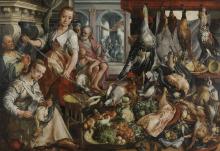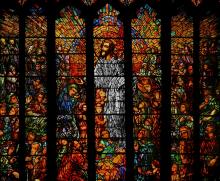Living the Word

THERE IS SOMETHING SPACIOUS about the gospel viewed through the keyhole of repentance. Something to the spare, Spartan spaces that mark a season of penitence. One chapel I know turns its altar so the people can see Jesus’ dying words: “I thirst.” Another adorns its sanctuary with a bare tree, not a leaf on it. The signs are those of severity. We make a hash of this world. We leave it bare. There is no health in us.
Lent says the tree will not always be bare. We will not always be health-less. And Jesus will not always thirst. Augustine of Hippo says Jesus thirsts for those gathered around him—he longs to drink them in, make them part of his body. That is, Jesus’ own murderers, the oblivious passers-by, his fellow convicts (his own disciples are long gone).
Lent is long. If you’re like me or my church, our Lenten devotions have grown a bit tepid by now. These final weeks are good times for renewal. The first weeks of Easter, in the ancient church, were a time when the newly baptized would gather daily to marvel at the wonders of their new faith. So too can we.
It’s been a year of strange happenings, politically and culturally. Our inclination is to lash out. There is plenty of blame to be distributed. Lent asks us to lash in. We are the first at fault, whoever we are. And then to praise. Try though we might, we cannot stop the Lord of life. And neither can anyone else.

THE WEEKS AFTER EASTER have always been especially important. Think of the first Easter—the bewildered disciples spent seven weeks being taught by a crucified and resurrected person. It must have been amazing, slightly unbelievable, then gone too soon. In the ancient church, Easter was a time for the newly baptized to immerse in the church’s odd and distinctive teachings. We dunked you—and then told you what that means. First Peter was originally a baptismal manual, a guidebook on the way to being the sort of peculiar people God wants (1 Peter 2:9). We do well during this month to look for extra opportunities for teaching. What does it mean to be baptized into a dead-and-alive-again person?
One thing it means in our own strange days is to craft creative ways to care for God’s beloved poor. We are experiencing a shredding of our country’s social safety net. Say whatever you like about it politically—the reality is there are more poor in more need. Someone is going to have to help. Why not us? It’s commanded in our Bible and our church’s heritage. There will be more of them, trust me. Our neighbors will notice and get curious about this Jesus about whom we teach. God desires a people of mercy who adore the poor, who treasure creation, who notice the dignity in every single human face. Not because it’s nice. But because God has a human face.
[ May 7 ]
Sacred Sheep?
Acts 2:42-47; Psalm 23; 1 Peter 2:19-25; John 10:1-10

EASTERTIDE IS IN FULL STEAM—heading toward the culmination of Pentecost. This is a season of holy rumor: “He is not dead.” “I know someone who saw him.” “My brother touched him.” “He was right here on this shore.” “He just walked through the wall.”
Those holy rumors fanned the flames of a transformed and transforming faith. It is easy to forget that the rumors of Jesus’ resurrected life went against some pretty powerful evidence: his public shaming and crucifixion, the continuing dominance and oppression of the unholy Roman Empire. At one level, nothing had changed; at another, everything had changed.
We remember, commemorate, and live into the resurrection waiting for the redemption and resurrection of all creation in a world in which it looks like nothing has changed. But there are these holy rumors, insistent whispers, and raised voices that do not care who is listening. There are rumors of life that transcend death. Even without first-hand witnesses in our time and against all the evidence, the church affirms the witness of the women who saw and proclaimed the risen Christ.
We still assemble, a church made up of many nations, waiting for the outpouring of the Holy Spirit to rekindle the embers of the holy faith that survives the empire’s best effort to extinguish it. The rumor is that God’s people will survive the present age and its empires, all evidence to the contrary.

THE WHOLE CHRISTIAN YEAR stretches toward this moment when we reach back to acclaim the power of God over death manifest in the resurrected life of Jesus. The passion and pageantry of the days from Palm Sunday to Easter Sunday enable believers to mystically live in the ancient moments we commemorate. At the same time, we are very much present in a world that is anything but resurrected; it is, as I often preach, “crucified and crucifying.” It is easy to find the broken places in our world and those that deal death. Where are the resurrection spaces? Where do we look to see that death does not, in fact, have the last word? What is our work in bridging the gap between death and life?
This month’s lessons brim with passionate faith on Jesus and his triumph over the grave. These accounts stem from nearly a century and more past the events that inspire their faith. The authors and editors of these texts also lived in a world in which the triumph of the resurrection was not apparent in many aspects of their lives; many went to gruesome deaths confident in the resurrection despite the power the empire wielded over their mortal lives. To strengthen our faith, they left us the accounts in the scriptures we read in this season. But we are not dependent on their words. We have unmediated access to the love and power of the resurrected Jesus.

AS THE CHURCH wends its way through Lent, the last days of Jesus become the focus of the lectionary. The story of those days is hopelessly entangled with the story of the early church establishing and defining itself. One consequence of this is the habit of the Johannine gospel (John 2:13-22) to blame “the Jews” for all that befalls Jesus. Its authors are a long way from Mark’s portrait of a Torah-observant Jewish Jesus (Mark 14:3-9). And yet John 3:16 proclaims the love of God for the world; no sibling rivalry can stand in the face of that love. Similarly, Jesus announces that he will draw all people to himself in John 12:32.
The epistles emphasize that Christ calls all, non-Jews (lumped together under the moniker “the Greeks”) and Jews, in 1 Corinthians 1:18. The emphasis on God’s love and mercy in Ephesians 2:4 makes this reading especially suitable for Lent.
The readings from Hebrews and Philippians on the last two Sundays focus on a heavenly Christ who is exalted, in sharp distinction to the earthly Jesus betrayed and executed in the passion gospel.
This diversity of texts reveals Jesus through the different lenses of his faithful at varying points in the church’s story, inviting us to add our vision and voice to the telling of that story.
[ March 4 ]
Exodus 20:1-17, Psalm 19; 1 Corinthians 1:18-25; John 2:13-22
THE TEN COMMANDMENTS spell out human responsibilities in the covenant between God and Israel, and subsequently to us, who have become party to that covenant. Not surprising, the commandments that pertain directly to God precede those that pertain to sister and brother human beings. The commandments are presented as being on the very lips of God. It is not clear whether God speaks through Moses or directly addresses the people. (In Exodus 20:18, the people witness the lightning, thunder, and smoke that accompany God’s speech and ask God not to speak to them, raising the possibility that they saw but had not heard or didn’t want to hear further.)

THIS MONTH SEES several liturgical transitions. Epiphany, the season of light and revelation, comes to a close. Jesus’ transfiguration is its own epiphany. The church enters the season of Lent, beginning with a focus on human frailty and failure—and for many people an evening (or week) of indulgence in things that bring joy, pleasure, and sweetness. The light is still there, but we are peering more intently at the shadows.
The opening prayer for Ash Wednesday in The Book of Common Prayer begins, “Almighty and everlasting God, you hate nothing you have made and forgive the sins of all who are penitent.” The readings for the first week present the God whose power and splendor in creation is only matched by her care for her children. The radiance of the transfiguration also shines a light on the ways in which we are not like Jesus, yet he chooses to leave the mount of illumination and return to the world that needs his light. The readings for the third week attend to the world God has made, calling us to care for it in partnership with God. And on the final Sunday, Jesus teaches about his death and resurrection, the greatest transition in the scriptures.

THE NEW YEAR OFFERS an opportunity to take stock of ourselves and our intentions for our own well-being. Radical attempts at self-reformation often end in frustration, including attempts to develop new spiritual habits. This month’s texts hold a up a series of mirrors in which we can assess ourselves and see perhaps that we do not need to be wholly reinvented. The Spirit who weaves through the early texts is present at creation and through the life of Jesus, and she remains to guide us.
Whatever the new year brings, we will not face it alone. In the second week, we have an opportunity to speak frankly about sexual misconduct or choose to preach different aspects of the lessons. The new year offers an opportunity to do the hard work of community, protect the vulnerable, and hold accountable those who violate sacred trust. We do so knowing the Spirit does not shrink from the subjects from which we shrink. She will be there with us through the difficult work. Likewise, the third week’s readings offer an opportunity to do the hard work of repenting and asking forgiveness before we try to be reconciled to those whom we have wronged. This is particularly important for people who hold power and in religious settings where pressure is often put on those who have been wronged to forgive before they have begun to heal from their injury—or while they are still being harmed. The final lections invite us to sit and stand in awe of God and treasure the knowledge that comes from those postures.

ADVENT MARKS THE BEGINNING of the Christian year, for many. We await the return of Jesus and prepare for it by revisiting the story of his first coming. In Isaiah 64, the prophet longs for God to tear the heavens and come down, a description more apt for the latter return of Jesus than his first appearance. The longing for Jesus to return and fix the world’s mess escalated for many last year about this time and was expressed by a widely read online Advent devotional under the hashtag F**kThisS**t. (The original title was unapologetically uncensored. The originators argued that “to convey a visceral gospel, we must sometimes use visceral language.”)
There is a theology that says one day God will clean house and fix everything. In the meantime, we have to live here. Advent is about waiting and preparation. What shall we do while waiting for the return of Christ? What can we do about the state of the world? The gospel for the second Sunday in Advent calls for spiritual work, confessing and repenting sins (Mark 1:4-5). The following week the gospel suggests that there is work to which we can put our hands: “Make straight the way of the Holy One” (John 1:23).

IN NOVEMBER, the season after Pentecost comes to a close. The church has reflected on the power of its genesis and its spread outward from Jerusalem. The lessons now represent one last opportunity to review the fundamentals before returning to the story of Jesus from its inception. Several of these scriptures communicate the notion that time is running out. Others emphasize the knowledge of who we are in God’s sight and who we understand Jesus to be. The season that began with the power of the Spirit breathing a new creation into the world ends this month with an affirmation of sovereignty.
The psalms that weave through this grand story move from the personal prayers of a pious person to the worship of a grateful congregation. The prophets echo each other: God is going to call the world to account and God acts to preserve her people. The epistles confess the theology of the ancient church with an urgent zeal, allaying its fear and anxiety about what is to come. The gospels communicate their own urgency. Rather than simply preparing the church to abandon its earthly ship, the gospels call us into relationship with one another, to care for each other as we would care for Jesus in the flesh for however long we tarry here.
The coming seasons of Advent and Christmas are marked by an adoration of the Christ child. But this longest season on the church’s calendar bids us to love and serve the Christ that is hardest to see, the one hidden in the flesh of each other.

There’s no standout theme that can be traced through October’s lectionary, which means that teaching and preaching will not be able to rely on the nice packaging of cool titles and catchy series. And those reading devotionally should not expect pet clichés. I suspect we need seasons of spirituality that are off the grid. It reminds me of my friends that live almost completely off the land. They are hard to track, but they maintain an abiding centeredness. Their keen sense of attention to their surroundings and their own bodies is unparalleled, because they have to anticipate both nurture and nature, rhythm and surprise, order and spontaneity.
We will need to be ready for no less surprises, twists, and turns in the lectionary for this month. We will also need the centeredness to act and lead. Scripted leadership and lessons won’t cut it. Improvisation is the skill to cultivate. Samuel Wells offers a framework that will guide us: “Improvisation means a community formed in the right habits trusting itself to embody its traditions in new and often challenging circumstances ... this is exactly what the church is called to do.”
This is the way of wisdom – a far cry from the pop Christianity of our day that offers formulas and platitudes.

ORDINARY TIME CONTINUES, in this season after Pentecost. The designation “ordinary” always strikes me as odd. This season is anything but ordinary in the common way in which we use the term. Ordinary typically means that something has no special or unique characteristics. Ordinary is simple, average, unexciting.
In one sense, the lectionary passages can be described as ordinary. There are no mighty battles or astonishing miracles or dreamy visits from God. The text is full of practical teaching, of how to live out the life of faith. Ordinary, right? And yet, the life to which the Spirit calls us is anything but ordinary.
A couple of warnings are in order. If you’re looking for material for “Seven Steps to (fill in the blank)”-style preaching and teaching, then don’t look here. These passages are not going to give you warm fuzzies about your personal relationship with Jesus. There’s nothing watered down or simple about God’s teaching and commands in these passages. We are called to nothing less than radical discipleship: Take up crosses, extend and receive God’s mercy, prioritize the poor for our salvation, and establish communities of trust. If you discover anything truly ordinary as you study and reflect, it is yourself. You cannot live this life ordinarily. We are in the stretch between Pentecost and Advent. You’ll need to connect to the power and patience of these traditions in order to live out the extraordinary call God has placed before such ordinary people.
[September 4]
Making Choices
Deuteronomy 30:15-20; Psalm 1; Philemon 1:1-21; Luke 14:25-33
Following Jesus is a costly business, as Luke reminds us, requiring sacrifice and shedding of our slave mind in order to move in freedom. But is that what we find in much of U.S. Christianity? In studying the spiritual lives of U.S. teenagers, sociologists Christian Smith and Melinda Lundquist Denton determined that teens’ reigning religious worldview can be described as “moralistic therapeutic deism.” Moralistic: God wants people to behave. Therapeutic: God wants everyone to be happy. Deism: God exists and started the world turning, but is now remote, without personal engagement.
Those from the underside of U.S. life, the disinherited, recognize this worldview for what it truly is: the leftovers from a Christianity that is more American than it is Christian. Frederick Douglass described it as “the corrupt, slaveholding, women-whipping, cradle-plundering, partial, and hypocritical Christianity of this land.”

AUGUST MARKS A TIME OF TRANSITION. Summer is fading. Fall is near. If you haven’t gotten your vacation in, it’ll have to be rushed because school starts shortly. Retail prices are “lowered” for back-to-school shopping. Churches are preparing for the return of students. Pastors are sneaking in a last-minute retreat or a continuing-education class. Church is in flux. What about our behavior, our faith lived out in the world? The lectionary passages for these weeks speak directly to this context of common life. How will we keep our promises? Will we prioritize the Sabbath? Are our interior and exterior lives built around hospitality?
God is not in flux, even if we are. God still longs for our worship. God is clear that the kind of worship that brings God joy leads to a life that demonstrates God’s peace and restoration. We’ll need more than good ideas and willpower. We’ll need the gift of faith to act in the world as if God is still making all things new. Even with all of the transitions around us, including the mechanics of church, we’ll need to make sure worship is as authentic and passionate as ever.
Do your pastor a favor and lend a hand, say a special prayer, extend grace. If you’re a pastor, then safety nets are in order. Now is the time to be connecting with colleagues, sitting with your spiritual director, visiting the therapist. Your people need you. You need God. The world needs the church!
[August 7]
Promises to Keep
Genesis 1:1-6; Psalm 33:12-22; Hebrews 11:1-3; Luke 12:32-40
In Genesis 15, we find Abram just out of battle. He’s recovered his nephew, women from his community, and loads of property. But there is still something missing: He has no children of his own to carry forward his name.
Abram is a visionary. But without God’s promise to bring the vision to fruition, he’s only dabbling in wishful thinking. How else can one cope with that moment when death is knocking, and the vision is still far off? “Like anybody, I would like to live a long life,” preached Dr. King. “Longevity has its place. But I’m not concerned about that now. I just want to do God’s will. And he’s allowed me to go up to the mountain. And I’ve looked over. And I’ve seen the Promised Land.”

THE “DOG DAYS” OF SUMMER refers to more than the weather. Attendance in churches is often down due to travel. The energy level is low, with students away and families scarce. The church year tends to gear up with the academic one, to peak with Christmas, to peak again with Easter, and then to peter out into the summer. How do we stay invigorated? How do we energize our faith with the zeal of the psalmist: “Come and see what God has done: God is awesome in deeds among mortals” (Psalm 66:5)?
I challenge churches to do something different with the summer—turn the dog days into an excuse to take risks. “Something different” will differ with context. Try a dialogue sermon. Answer live tweets from the youth. Preach a sermon entirely in the interrogative mood—nothing but questions or one that, like the psalms, is addressed solely to God. Invite testimonies about faith and service. Invite mentors who inspired you into ministry to offer their story during worship or Bible study. With the elections coming, talk about how the church has engaged with politics through history—and don’t leave out the bad stuff. Immerse yourself and your community more deeply in the gospel for the renewal of your life together, always an aspect of church and worship.
Summer is often a season of travel and meeting strangers. Remember that Abraham and Sarah offered extravagant kindness when they met three strangers in the desert. How can we become known, like Abraham, as “the friend of strangers”?
[July 3]
A Livable Faith
Isaiah 66:10-14; Psalm 66:1-9; Galatians 6: 1-16; Luke 10:1- 11, 16-20
ST. AUGUSTINE describes breast milk as a sign of the goodness of God. Who would dare say he’s wrong? It’s so there—abundant, nurturing, creating intimacy. It’s like God with all of us. But Augustine isn’t being original here. Isaiah is. God is a nursing mother, Israel is a nursing child, and both are happy with one another.
Eugene Peterson has made a career of insisting on the “livability” of scripture. We can do this stuff—with a healthy dose of the Spirit’s power. Coastal Church, a Pentecostal congregation in downtown Vancouver, made Luke 10 a sort of constitution for its life together. Rather than preach or protest at people, it has made a point of visiting people’s homes (already difficult in an age that loves privacy). They offer blessing. They ask what hurts and pray for it. They eat together. And they speak of the reign of God. The church has grown, lonely neighbors find surprising friends, and the reign is manifest.

IF YOU ASSOCIATE PENTECOST only with charismatic preachers, ecstatic worship, and tongue-talking, then you had better return to scripture. The lectionary passages for this Pentecost season are dark and sad, with a central focus on theodicy, which asks the question: How can there be a good and loving God when there is so much injustice, pain, and suffering in the world? The question has taken many forms: Is God a white racist? Is God a cosmic child abuser? Who can bear these questions, let alone seek to answer them?
Scripture gives no easy or trite answers. In fact, there are no clear attempts to resolve the issue. In the words of one writer reflecting on theodicy through her own battle with cancer: “I find myself returning to the same thoughts again and again: Life is so beautiful. Life is so hard.” The lectionary reminds us over and over again that pain and suffering are part of life. You’ll have to weed through the popular theologies of the day, and even examine your own implicit theology, if you want to stand a chance at leading God’s people in how to respond to and live within the problem of pain and suffering in our world. Liberation is not always the conclusion. Neither is bondage. And blaming God is futile. At the core of these lectionary passages, you find a God who stands in the midst of suffering and pain, offering a variety of ways to cope, to heal, to resist.
[June 5]
Evangelism and Justice
1 Kings 17:8-24; Psalm 146; Galatians 1:11-24; Luke 7:11-17
“Preach the gospel at all times; use words when necessary,” a phrase often attributed to St. Francis of Assisi, reminds us that genuine revelation leads to mission. That’s a key message we find in the lectionary passages for this week.

MOST OF OUR HOLY DAYS have been colonized. The commercialization of Christmas and Easter is not quite evil, but it is certainly an obstacle to deepening one’s faith.
Pentecost, however, we have all to ourselves. No one has figured out how to market it, perhaps because we Christians have so deemphasized it compared to our other great feasts. The Holy Spirit has sometimes been spoken of as the “shy” person of the Trinity. She’s always pointing to Jesus. The Spirit is fine to let Jesus have all the attention.
But what a feast to have all to ourselves! One in which all nations are drawn to worship Zion’s God. This flood of peoples is long promised in Israel’s scripture and is now made good by Christ’s Spirit.
North American culture continues to wrestle with racial politics. William Barber speaks of these days as a Third Reconstruction, after prior ones that arrived with Emancipation in the 1860s and the civil rights movements in the 1960s. This Third Reconstruction era includes #BlackLivesMatter, immigration, and struggles for citizenship wrestling against the demagogic, bloviating “No!” of politicians.
In all this, Pentecost says, “Yes.” I’m tempted to say “quietly,” but this yes is not quiet. It’s a hurricane. It’s followed by a sermon all listeners can hear in their own language. Even if the disciples can’t speak all those languages, God can. God made all nations. God called Israel to be God’s light and bride. And now, through Jesus, God is drawing all God’s beloved peoples again. The church must show this in our life together.
And (don’t forget this!) those from all nations have to die to ourselves and be raised in Christ’s image. God is speaking, church! All we have to do is join in.

THE SUNDAY AFTER EASTER we all take a breath. We’ve worked hard to offer our best for Easter. Ministers often have had to preach more than our accustomed once a week. Choirs have gone all out. The sanctuary has been cleaned and decorated and trampled upon and cleaned again. Worship services may even have been lively and full. Now, as the Easter season settles in, all goes back to normal. We gather these Sundays not for spectacle, but for the risen Christ, refracted off the faces of one another.
The lectionary readings send us into unfamiliar territory. During these days, there’s not an Old Testament reading in sight—the book of Acts functions as the history of God’s faithfulness. Revelation tears a hole where Paul usually is. The gospel texts speak to the unbearable newness of a risen Lord reorienting the world around himself.
In the ancient church, those baptized at the Easter vigil would first be stripped naked before going under the water. They then donned a new robe as a sign of “putting on” Christ—and wore it throughout the Easter season. They went to church daily, learning what it meant to be “in Christ.” Had they ever seen a baptism before attending their own? Had they ever shared in Eucharist until they tasted one? I wonder whether the Easter season can be a new normal. Not one where we settle for the ordinary, but one where we take part in the risen Christ’s wrapping of all reality around the empty tomb.

These weeks are the high point of the Christian year. They are also taxing for those who are preachers. The Sundays seem to come around every few minutes, while liturgies fly at you even faster during Holy Week. All the more important, then, to dine on the Word ourselves, before we feed others from what we’re cooking. Thankfully, the church has set aside the richest texts we have to describe the mystery that is beyond describing—that God is in Christ reconciling the entire world. Often we can’t even reconcile—piece together—our own lives! Let alone our families, churches, communities. Thankfully, we don’t have to. God already has. Our work is announcing what’s been completed and enjoying its fruits.
The liturgies of Lent, the Passion, and Holy Week are what seep deep into people’s bones. Our words bring to light what God is already doing. Make use of these. Have worship on Wednesday to wash feet and on Maundy Thursday to join in Jesus’ inauguration of the Lord’s Supper. Do like the African-American church has done and invite people to gather for three hours on Good Friday to hear seven sermons. Gather like the Orthodox and the Catholics at dawn on Easter, light a fire, and have folks process into church carrying the light of Christ and singing. It’s a week of revival, as evangelicals put it. God isn’t just resurrecting Jesus. God’s stitching the church back together—and the universe too.
[March 6]
Dereliction and Duty
Joshua 5:9-12; Psalm 32; 2 Corinthians 5:16-21; Luke 15:1-3, 11b-32
You could live with each of these texts every moment left in your life and never exhaust them. They have an accent on forgiveness, grace, and celebration. This is already odd in Lent—a season in which, traditionally, we train ourselves not to say “hallelujah” so that it will ring out all the sweeter on Easter when our lips curl around its contours for the first time in weeks. Israel’s disgrace is “rolled away,” as the word “Gilgal” announces (Joshua 5:9). Happy are we when our “sin is covered” (Psalm 32:1), when God is our hiding place. And Christ is reconciling every atom in the universe—and more miraculously still—entrusting us (us!) with God’s ministry of reconciliation (2 Corinthians 5).
Luke 15 is more staggering still. It is often misnamed “the prodigal son.” But as Tim Keller and others have pointed out, it is the father who is most extravagant here. The father, as if he dies to himself, gives the younger son his inheritance. Then, when the younger son returns, the father celebrates with what is left (presumably cutting into the elder’s share). The younger son’s depth of dissolution would have drawn a reflexive shudder from the story’s first readers (Pigs! Akin to, say, roaches for us). And the elder son is just as lost as the younger—he just has a better strategy for getting the father’s stuff by dutifully waiting for dad’s death. Better, that is, until he runs headlong into his father’s rule-transcending generosity.

LENT IS A GIFT. It is a hard scrub brush for when we’re covered with grime that won’t come off in an ordinary bath.
Lent is popularly associated with “giving up” things. This giving up is easy to lampoon. When I gave up meat once, a friend said, “If you want to go on a diet, don’t pretend you’re doing it for Jesus.” Lent is a remarkably ineffective season for weight loss. Every Sunday is a celebration of the resurrection, so Sundays aren’t technically days of Lent. On Sundays you can indulge as much as you want. It’s not the best diet plan. But it does remind us that resurrection crowns every week and so every fast.
Lent is our minor participation in Jesus’ 40-day fast, which is itself a participation in Israel’s 40-year sojourn in the wilderness. It’s meant to be hard (a friend who loves to fast says he gives up fasting for Lent!). In Lent we say “no” to just a few of our desires. This is counter-cultural in a Western world bent on saying “yes!” to every consumerist desire, however bizarre. But these little “no’s” are really geared to help us say “yes” to Jesus more. It might hurt at first, especially if we’re not used to it, like every good habit. And in the gospel’s strange economy, saying no is the way to life.
[February 7]
A Face Alight
Exodus 34:29-35; Psalm 99; 2 Corinthians 3:12- 4:2; Luke 9:28-43a
YOU'VE SEEN FACES shine before. Think of the radiant pregnant woman. Think of a speaker or an athlete or a dancer in a groove, performing like few can. Think of those few moments in life so magical you can’t stop smiling.
Moses’ face shines so brightly his fellow Jews ask him to cover it. He’s in the presence of a light so incandescent it has been known to kill people. Moses’ face is like the light of the moon—a reflection of a greater light on which we cannot look directly.
If Moses’ face shines, Jesus’ whole body shines. So does the mountaintop all around. Moses turns up to join in the shine, along with Elijah, and they discuss the “departure” or “exodus” (Luke 9:31) that Jesus will soon accomplish at Jerusalem.

THE YEAR IS YOUNG AGAIN. Folks are making soon-to-be-broken New Year’s resolutions. Why not preachers? Resolved: Prepare to preach far enough in advance that the Holy Spirit has some time to work with me. Preachers I admire sketch an entire year out in advance. Pastor Ken Shigematsu at Tenth Church in Vancouver, B.C., suggests that we’re creative on 10-day cycles. So he begins working in earnest on a sermon 10 days before he preaches it. Whatever system you come up with, resolve not to preach “Saturday night specials.” Sure, the adrenaline is nice, but it’s as hard to be creative on demand as it is to be intimate on schedule. That way, when you have a brilliant insight you can see that it fits, say, 10 weeks from now, and that insight is not lost if it fails to live up to the demands of a sermon to be preached in 10 hours.
Epiphany is one of our best, most underutilized words. The chapel at our seminary is blessedly named Epiphany chapel. For no actual connection to God happens in preaching without the illuminating light of the Spirit. I like to preach through the old hymn “We Three Kings” at least once during Epiphany. It reminds us who God is: God is born in our flesh, hailed as prophet and as king, and will die at our hands. Especially during an election year in the United States, when many ridiculous things will be said about God, we do well to remember these particular claims about who God is.

ONE OF THE BEDROCK assertions of the Christian faith is that the kingdom of God is coming.
Jesus announced God’s reign, and embodied it, and brought it among us, but it is not here yet in full. The world’s brokenness and our own selfishness are testament enough that the kingdom is not here in full. But it is coming. And there’s not a thing we can do to hurry it, or stop it, or even delay it. We can, however, join in with it. That’s the best recipe for how to be a human being.
Advent’s reliable annual return is like the kingdom in its future certainty. The blue or purple paraments, the hymns in minor key, the candlelight, the longer nights—they all return, annually, like an old friend. Advent is a season of longing. The church places herself in the position of Israel, crying out for a savior. The hymns express this longing (“O Come Emmanuel, and ransom captive Israel, that mourns in lowly exile here”). Some churches have a “longest night” service on or around Dec. 21 for those who have experienced especially acute grief in the past year. Advent reminds us that life is not all cheerfulness, as if we needed reminding. It’s also sorrow, longing, waiting, and hoping.
Then Advent returns, ready or not. Just like Jesus and the reign he’ll soon bring in full. It’ll be here before you know it. And it’ll amplify the best parts of human life. It will shear off the worst parts. And it will make the world the one God dreams about.